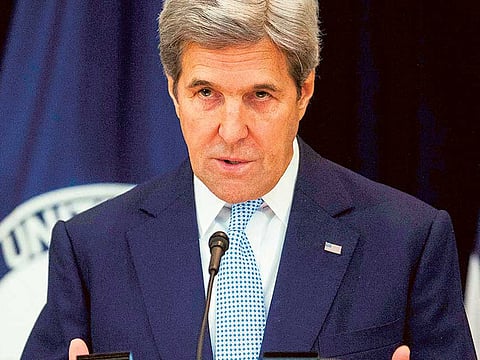Two-state plan nears the end of its shelf life
If Obama and Kerry were playing for history, Netanyahu and Trump were playing for time

Even before United States Secretary of State John Kerry issued his scathing critique of Israeli policies on Wednesday, President-elect Donald Trump essentially told Israeli Prime Minister Benjamin Netanyahu to ignore it.
“Stay strong Israel,” Trump wrote on Twitter. “January 20th is fast approaching!”
Netanyahu responded warmly. “President-elect Trump, thank you for your warm friendship and your clear-cut support for Israel!” he wrote, adding Israeli and American flag emojis.
Kerry’s much-anticipated Middle East speech brought together four giant personalities representing two radically divergent worldviews in one momentous clash.
On one side was Kerry, venting years of frustration on behalf of President Barack Obama and himself at what they consider Israeli intransigence.
On the other were Netanyahu and Trump, firing back at what they deemed a hypocritical betrayal of America’s closest friend in the Middle East.
If Obama and Kerry were playing for history, Netanyahu and Trump were playing for time.
The departing administration intended for the speech to lay out a path to peace that they had tried to take, hoping to salvage some scrap of a legacy on the issue. The incoming administration and its Israeli ally were busy counting the days until the old team will be swept from the stage and a new Israeli-American alignment redefines the politics of the region.
Obama and Kerry have painted Israel into a corner, providing ammunition to its critics and effectively isolating it on the world stage after a United Nations Security Council resolution last week criticising Israeli colonies and the secretary’s sharp assessment on Wednesday. But in three weeks, Netanyahu expects unstinting support from Trump, who so far appears to be promising it.
Amid the harsh exchanges was the increasing sense that the two-state solution to the Palestinian-Israeli conflict favoured by much of the world no longer seems plausible, at least for now. When Kerry outlined six principles for a final land-for-peace agreement, he largely tracked long-standing US orthodoxy. But unlike when former president Bill Clinton did something similar 16 years ago, it sounded more like a requiem than a plan.
“The positions he lays out are well known to all of us,” said Michael Herzog, a member of the Israeli negotiating team during the latest round of failed talks, led by Kerry in 2014. “There were no major surprises. The question is, does it really matter?”
Indeed, among the blaring, polarized responses to Kerry’s speech, the one conclusion that drew agreement across political lines was that the two-state solution may be all but buried.
“This will go down in history as an eloquently delivered eulogy to the two-state formula, which is in itself a recipe for disaster,” said Oded Revivi, the Chief Foreign Envoy of the Yesha Council, which represents Israeli colonists.
“John Kerry just gave an eloquent eulogy for the two-state solution,” said Ali Abunimah, a Palestinian-American activist who helped found the Electronic Intifada, a website focused on the Palestinian side of the conflict.
While Netanyahu still formally supports a two-state solution, few believe his heart is in it, and voices on the far sides of the conflict are increasingly talking about a one-state solution, albeit one conceived in starkly different ways.
From his right flank, Netanyahu faces calls within his coalition to give up the two-state formula and instead annex parts of the West Bank. From the other side, some Palestinians now advocate a single state from the Mediterranean Sea to the Jordan River in which everyone has an equal vote, knowing that Palestinians would ultimately outnumber Jewish citizens in such a country.
The rift between Obama and Trump may further polarise a debate that has divided the world for decades. With such a harsh assessment by the departing Obama administration, Israel has for the moment lost its staunchest defender in the international arena, and its critics may feel emboldened to press for more action against it in the form of sanctions, boycotts or legal cases.
Conversely, the impending arrival of Trump and his unqualified support for Israel have already inspired the Israeli right to press for more aggressive policies that would move the country even further from compromise. After nearly eight years with Obama, Netanyahu for the first time may feel little or no US pressure to make concessions.
Netanyahu has reacted to the UN resolution and Kerry’s speech as if they were “a declaration of war”, a phrase he reportedly used before the Security Council vote last week in trying to persuade New Zealand to drop the measure. Trump, after initially saying he wanted to be a neutral figure in the Israeli-Palestinian conflict, has thrown in his lot with Netanyahu — especially since the election, perhaps encouraging the prime minister to castigate the departing president and secretary. “Israelis do not need to be lectured about the importance of peace by foreign leaders,” Netanyahu said after Kerry’s speech.
After all the stormy exchanges and recriminations, the remaining question is where Trump’s alliance with Netanyahu will lead. Trump fashions himself a deal-maker, and this would be the ultimate deal. Having embraced one side of the conflict so avowedly, could he craft a mutually acceptable bargain where Obama and Kerry failed? Would he deem it in his interest to try? And would Netanyahu want him to?
As Trump put it, Jan 20 is fast approaching.
— New York Times News Service
Peter Baker is an American political writer and newspaper reporter who is the White House correspondent for the New York Times and a contributing writer for the New York Times Magazine.



